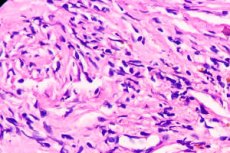New publications
Scientists have stripped brain cancer cells of their ability to survive with a new method
Last reviewed: 02.07.2025

All iLive content is medically reviewed or fact checked to ensure as much factual accuracy as possible.
We have strict sourcing guidelines and only link to reputable media sites, academic research institutions and, whenever possible, medically peer reviewed studies. Note that the numbers in parentheses ([1], [2], etc.) are clickable links to these studies.
If you feel that any of our content is inaccurate, out-of-date, or otherwise questionable, please select it and press Ctrl + Enter.

When you turn off the brakes on a race car, it quickly crashes. Dr. Barak Rotblat wants to do something similar with brain cancer cells: turn off their ability to survive when glucose is depleted. He aims to speed up the tumor cells so they die just as quickly. This new approach to treating brain cancer is based on a decade of research in his lab.
New discoveries
Dr. Rotblat, his students and co-lead researcher Gabriel Leprivier of the Institute of Neuropathology at University Hospital Düsseldorf published their findings last week in the journal Nature Communications.
Until now, it was believed that cancer cells were primarily aimed at growth and rapid reproduction. However, it has been shown that tumors have less glucose than normal tissues.
If cancer cells are completely focused on rapidly reproducing, they should be more dependent on glucose than normal cells. However, what if their absolute priority is survival, not exponential growth? Then triggering growth when glucose is in short supply could cause the cell to run out of energy and die.
Prospects for personalized medicine
"This is an exciting discovery that we have made after a decade of research," explains Dr. Rotblat. "We can target cancer cells exclusively without affecting normal cells, which will be an important step toward personalized medicine and therapies that bypass healthy cells in the same way that chemotherapy and radiation do."
"Our discovery of glucose starvation and the role of antioxidants opens a therapeutic window for the development of a molecule that could treat glioma (brain cancer)," he adds. Such a therapeutic agent could also be applied to other types of cancer.
Research and its results
Rotblat and his students, Dr. Tal Levy and Dr. Haula Alasad, began by considering that cells regulate their growth based on available energy. When energy is abundant, cells accumulate fat and synthesize lots of proteins to store energy and grow. When energy is limited, they must stop this process to avoid running out of energy.
Tumors are generally in a state of glucose starvation. Researchers have begun to look for molecular brakes that allow cancer cells to survive in a glucose deficit. If they can be turned off, the tumor will die, and normal cells that are not starved of glucose will remain unharmed.
MTOR pathway and the role of 4EBP1
Rotblat and his team studied the mTOR (mammalian target of rapamycin) pathway, which is equipped with proteins that measure a cell’s energy state and regulate its growth. They found that a protein in the mTOR pathway known as 4EBP1, which inhibits protein synthesis when energy levels drop, is essential for the survival of human, mouse, and even yeast cells when starved of glucose.
They demonstrated that 4EBP1 does this by negatively regulating levels of a key enzyme in the fatty acid synthesis pathway, ACC1. This mechanism is used by cancer cells, especially brain cancer cells, to survive in tumor tissue and create aggressive tumors.
Developing a new treatment
Dr. Rotblat is now working with BGN Technologies and the National Institute of Biotechnology in the Negev to develop a molecule that will block 4EBP1, causing glucose-starved tumor cells to continue to synthesize fat and deplete their resources when glucose is depleted.
